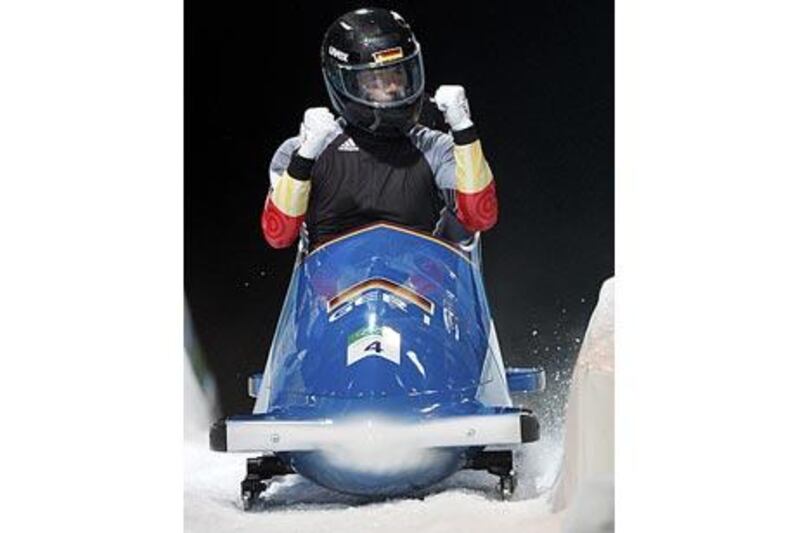VANCOUVER // Germany's Andre Lange partnered Kevin Kuske to victory in the two-man bobsleigh on Sunday to claim his fourth Olympic gold medal to become the most successful bobsleigh driver in history. Lange and the long-time brakeman Kuske completed their four runs on the Whistler Sliding Centre's tough and technical track in 3:26.65.
Germany's Thomas Florschuetz finished second in 3:26.87 to win silver, and Russia's Alexsandr Zubkov took the bronze in 3:27.51. Lange, the defending Olympic champion in two- and four-man, surpassed the German Meinhard Nehmer's three golds for the most bobsleigh gold medals for a driver. Lange, 36, also won the four-man event at the Salt Lake Games in 2002. Nehmer won three golds in 1976 and 1980 in a sport that has been an Olympic event since 1932. "For me it's an historical medal, to win the Olympic gold again, but it will take time to really realise what's happened," he said.
"This has been a long career for me, many years of fighting and hoping, racing and medals, which is now nearly over. For me it's a really happy end, I didn't really expect to win here." After four sleds crashed during Saturday's first two heats, there were no accidents in the third or fourth runs. Regardless, Lange separated himself from the competition. Over two days, Lange made his way around this treacherous 16-curve track like he owned it. A course that confounded some drivers and drew criticism from outsiders who feel it may be unsafe after a luger died in a training accident, was humbled by Lange.
Lange's sliding career began when he was eight, but not in the bobsleigh's front seat. Luge was his first calling, and while he enjoyed the thrill of hurtling down tracks on his back and steering with his feet, he realised that success would not be in his future. By 1993, he switched to bobsleigh. He has been on the ride of his life since. Now he is a key member of the German team in sliding. With nine medals from luge, skeleton and bobsleigh in these Games, Germany have matched their biggest Olympic medal haul in sliding events since beginning to compete under a unified flag again at the 1992 event.
They also won nine medals in 2002 (five in luge, four in bobsleigh). And this year's total is expected to rise, with women's and four-man bobsleigh events to come. China's women curlers gave Canada their first defeat of the tournament in an extra-end match, while the Canadian men had another win. Wang Bingyu sealed the 6-5 win for China in an extra 11th end, sending Cheryl Bernard's Canadians to their first loss in six round robin games.
Bernard forced the extra end with a take out in the 10th, but her final stone of the game collided with a rock outside of the rings and did not come close to reaching its target. The Canadian men, meanwhile, assured themselves the No 1 seeding for the semi-finals after a 6-4 victory over Switzerland. The Canadian men and women have lost just one of a combined 13 matches on the curling ice in Vancouver. Next up are the defending champions Sweden, who easily beat the United States 9-3 in nine ends.
Canada's only remaining games leading to the semi-finals are against the Americans and China. The British captain David Murdoch's foursome bounced back from their loss to Canada with a 4-2 win over the US, all but assuring elimination for the Americans. sSweden rallied to beat second-place Norway 8-7 and Denmark defeated Germany 9-5. Day nine of competition brought a third gold for the Netherlands' speedskating team, and a second gold for the German biathlete Magdalena Neuner.
The US ski team, already the medal leaders of the Games' Alpine competitions, sealed their dominance with Bode Miller's come-from-behind win. Aksel Lund Svindal, who won gold for Norway in the men's super G, had led after the downhill round and Miller trailed a distant seventh. But the American, silver medallist behind Svindal in the super G, set the pace with a blistering slalom and Svindal was unable to finish after missing a gate.
* AP





